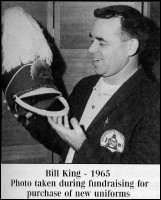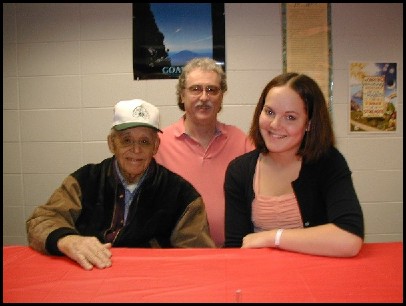 Reprinted from Menominee Remembered 2004
Reprinted from Menominee Remembered 2004
"I don't remember exactly when it occurred. I don't remember that part..." These were Bill King's exact words as he told me about how he lost part of his finger when he was only a year and a half old. This is his first memory as a child. "The neighborhood boy rolled a big boulder down and I was creeping around and it happened to go over my hand, and it took off my finger," claimed Bill. "My dad took me to the hospital and they tried to grow it back on but it wasn't working so I had to go back and get it amputated. He had to take me there by lying to me that he was going to take me to the dime store in Marinette," said Bill as he told me how his dad brought him to the hospital.
Bill was born in Menominee at St. Joseph Lloyd Hospital on November 18, 1923. As a child he lived in the neighborhood at the 1100 block of Holmes Avenue, which is now 13th Ave.
In Bill's family there were four children: He, his sister, and two younger siblings. While growing up in his home he and his sister had most of the house chores to do because they were the oldest two of the four kids.
Bill's sister did most of the housework such as cooking and doing the dishes while Bill did things like cut the lawn and weed the garden. In 1931 when Bill was eight years old there was a fire that started over at the Wells Lumber Yard. His father, who drove a milk wagon, was told not to do his rounds that day and to bring his horse home to keep it safe. "They thought the whole town was going to be wiped out."
All day during the fire Bill and his sister had to hose down the roof of their house so it wouldn't catch on fire from the flying sparks and cause the house to burn down. Luckily the wind shifted and blew the sparks over the bay and the rest of the town was saved.
For fun as a kid Bill and his friends would go down to the "lime kiln" field and play football, baseball, and kick the can. "Everything under the sun we did there." is how Bill explained it.
In high school Bill's favorite subject was history. In this class they talked about the war and what was going on in the world at the time.
After Bill graduated from high school in 1941 he worked at his dad's dairy for one year. Soon after that he was drafted and sent to war.
Bill got out of the service in 1945 when he was nearly 22 years old. When he got home he went back to the dairy. In 1964 he started to work at radio station WAGN.
While he was doing all this, he was also active in the VFW and the Legion and in the monthly magazine were articles of senior and junior drum corps. In 1953 the U.P. Legion convention was held in Menominee and they had senior drum corps play on Blesch field. A couple of the people thought it would be a good idea to start a junior corps in Menominee.
Bill was elected commander of the Legion that year so he automatically sat on the board of directors of the DAR. Soon after, Bill got together with two other men, Axel Thompson and George Paitl, and they started talking about how they should start a junior drum corps in Menominee. When Bill agreed, the other men told Bill he could talk and bring it up at the next meeting. At the next meeting Bill brought up the subject of starting a junior corps and it was approved.
Bill was put in charge of running the drum corps through the DAR Boys Club. He had to report on how they were doing, and that's how the Menominee Northernaires Drum corps started in 1953. "Drum Corps started mostly out East and spread through the VFW and Legion then spread into the churches and other organizations in the country where they started sponsoring junior drum corps and that interested me," claimed Bill.
In the first year of the Menominee Drum Corps there were 40 boys that signed up and they put together a little corps. "I was the manager of the corps and after 1958 the drill instructor, but we had George Paitl and Harold Nowakowski" said Bill. George left and Harold asked Bill if he would come to work with him. They happened to be good friends from the war and they worked together for two years. They planned drills, wrote them out, and taught them to the boys. "It was only for a couple of years and then Harold died suddenly which left me alone, so I took over, doing two jobs with them. I wrote the drills for 11 years." explained Bill.
When this happened the boys did real well. They placed 19th out of 56 corps in the national championship Legion Contest in 1958. Then in 1959 the Menominee Northernaires went up against a class A corps, the Racine Kilties, who were formerly the national champions. The boys had just gotten all new uniforms and new equipment and they looked really nice when they went out on the field and they won. "No one expected it; not even us. That's when the judges started recognizing us, and from then on we did well all the time," was Bill's comment. This is one of the contests that Bill said will always stand out in his memory.
The next year 125 boys signed up. "We were really in business then. We bought uniforms and we practiced," said Bill. They practiced a lot of times at Blesch stadium, down at Memorial Beach, or in the field where the present Menominee High School is.
For transportation to competition they took charter buses. The Menominee Northernaires Drum and Bugle Corps marched 42 horns, 20 drums, and 20 in the color guard. This was the set up that they maintained through 1973, at which time they stopped competing. It was becoming impossible to compete because they were from such a small town and couldn't raise enough money. Competition was becoming more and more expensive each year.
Before the Northernaires disbanded, people involved with the organization made a lot of sacrifices. Bill King said the main thing that he had to sacrifice was time. A lot of this time was spent on practice at least three or four times a week and often until dark. Other time consuming events would have been getting the equipment ready and getting fund raisers organized. Bill also mentioned that when things went wrong or there was a problem between some of the boys he would have to go out of his way to solve these problems. "They would come to you for advice. You would have to be like a father. I had to be like a father to 82 boys. I tried to do my best not to influence them wrongly. That was my main worry. I said a prayer for them every night," explained Bill.
In 1968 Bill got an ulcer that his doctor thought was caused by too much pressure and tension brought on by the drum corps. His doctor recommended he quit the drum corps, but he didn't, until late in the summer of 1968 when they were doing the local "Drums in the North" competition at Blesch Field. "What we did is we worked with the Ishpeming Blue Notes Corps and we'd arrange a weekend contest where all the units would perform at two contests and two parades. We had one on Saturday and one on Sunday and we rotated Saturday and Sunday between us. We would go to each competition one of the drum corps refused to play in the contests, and when Bill was told this, it was too much for him. The programs were already printed and ready to go and the corps that was refusing to march was an important one from Milwaukee. Bill got very sick that night and his doctor made a house call and told Bill that he either quit the drum corps or stay with them and risk dying. After this rude awakening, Bill decided to quit and give up his role in the Northernaires Drum Corps.
Before completely giving up his role in the Northernaires, Bill's favorite thing about competing was winning, and the boys loved to win. Therefore this made for an awesome team that worked hard. It is too bad they ever had to stop. That's how the Menominee Drum Corps got started in the word of the creator himself, Bill King.
In the future, although Bill is 80 years old, he says he will stay with the alumni group and attend the parades, cut back his hours working as the curator at the museum, and live life to the fullest.
Cassie Callahan

Bill King, John Wills, the teacher responsible for “Menominee Remembers,”
and Cassie Callahan, the student that did the interview with Bill.












